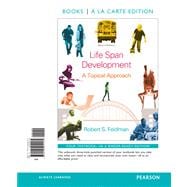Current Research and Real World Application.
Updated in its second edition, Life Span Development: A Topical Approach maintains the student friendliness that has been the hallmark of Feldman’s development texts. Rich in examples, it illustrates the applications that can be derived from the research and theory of lifespan developmentalists. The text takes a modular approach providing both readers and instructors with maximum flexibility.
MyPsychLab is an integral part of the Feldman program. Key learning applications include, MyPsychLab video series, MyVirtualLife, and MyVirtualChild.
Teaching & Learning Experience
- Personalize Learning — MyPsychLab is an online homework, tutorial, and assessment program. It helps students prepare for class and instructor gauge individual and class performance.
- Improve Critical Thinking — “Review and Apply” sections consist of short recaps of the chapters’ main points, followed by questions designed to provoke critical thinking.
- Engage Students — At the beginning of each chapter are Chapter Opening Prologues, a short vignette, describing an individual or situation that is relevant to the basic developmental issues being addressed in the chapter.
- Explore Research — “From Research to Practice” boxes describe current developmental research or research issues applied to everyday problems.
- Support Instructors — All supplements were developed around the textbook’s carefully constructed learning objectives.
This Book a la Carte Edition is an unbound, three-hole punched, loose-leaf version of the textbook and provides students the opportunity to personalized their book by incorporating their own notes and taking the portion of the book they need to class – all at a fraction of the bound book price.








